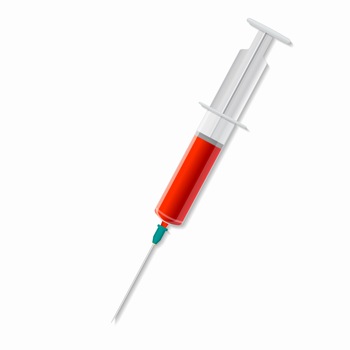
If you check your thyroid levels in the afternoon with a blood draw, results may come back normal even though you're hypothyroid, according to a new study. Checking your TSH in the morning can give you more accurate results.
Like other hormones in the body, thyroid-stimulating hormone (TSH) follows a daily rhythm and is not consistent throughout the day. Researchers in the study evaluated untreated patients with subclinical hypothyroidism along with patients taking a T4 hormone. They tested the participants' TSH before 8 a.m. and again between 2 and 4 p.m.
In both groups TSH dropped substantially during the afternoon test, which would have led to hypothyroidism not being diagnosed in about 50 percent of the untreated participants.
Their TSH was 5.83 mU/L in the morning and 3.79 mIU/L in the afternoon. In the group being treated with thyroid medication TSH was 3.27 mIU/L in the morning and 2.18 mIU/L in the afternoon.
A 2004 study also showed that late morning, non-fasting TSH dropped 26 percent compared to early morning, fasting TSH.
Timing of TSH test adds new ammunition to thyroid range controversy
The researchers concluded that the timing of your blood draw plays an important role in how to decipher the results of your thyroid panel.
Unfortunately, even with an early morning blood draw, many hypothyroid patients still slip through the cracks because most doctors use ranges that are too wide.
It's still very common for doctors to diagnose hypothyroidism using a TSH range of 0.5 to 5.0 mIU/L even though the American Association of Clinical Endocrinologists recommended years ago the range should be 0.3 to 3.0 mIU/L.
Functional medicine uses narrower ranges and more markers to identify hypothyroidism
In functional medicine we use an even narrower range of 1.8 to 3 mIU/L. We also know in functional medicine that looking at TSH alone can miss hypothyroidism.
For some, TSH may be normal but other thyroid markers are off. That's why it's important to order a thyroid panel that looks at a more complete thyroid picture, which can include total and free T4 and T3, reverse T3, free thyroxine index (FTI), T3 uptake, and thyroid binding globulins. Many conditions can cause poor thyroid function, including inflammation, hormonal imbalances, and chronic stress. Evaluating other thyroid markers gives insight into these imbalances.
Always screen for autoimmune Hashimoto's hypothyroidism
In addition to these markers, anyone with hypothyroid symptoms should be screened for Hashimoto's, an autoimmune disease that attacks and destroys the thyroid gland. Hashimoto's accounts for about 90 percent of hypothyroid cases in the United States. You screen for Hashimoto's by checking TPO and TGB antibodies.
Although thyroid medications may be necessary to maintain thyroid function, they do not address the immune system's relentless attack against the thyroid gland. Not managing Hashimoto's increases the risk of developing other autoimmune diseases. These can include pernicious anemia, rheumatoid arthritis, vitiligo, and Type I diabetes.
Ask my office how to properly evaluate your thyroid symptoms and lab markers for appropriate thyroid management.





Latest from the Blog
Breaking Through Cancer Barriers: News Outlets Spotlight High-Dose Vitamin C Therapy
December 5, 2024https://www.yahoo.com/news/pancreatic-cancer-patient-survival-doubled-152722177.html Harnessing the Power of High-Dose Vitamin C in Cancer Treatment Recent advances in cancer treatment research have brought renewed attention to high-dose intravenous (IV) vitamin C, particularly in extending survival rates for patients with advanced different forms of cancer. A groundbreaking phase 2 clinical trial Study Finds demonstrated that combining high-dose IV vitamin C […] Read more
Latest from the Blog
The Dirty Dozen
The “Dirty Dozen” is a list of fruits and vegetables, compiled by the Environmental Working Group (EWG), that you should always eat organically. These produce items are not only delicious and nutrient-rich but also tend to carry high levels of pesticide residues when grown conventionally. By opting for organic versions, you can significantly reduce your […] Read more